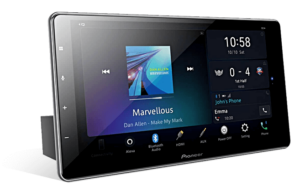Key points
- Pioneer Corporation, a dominant player in India’s in-car entertainment aftermarket, reveals its product roadmap for the future.
- The company plans to enter the direct-OEM supplies market in India and sets up two R&D centres in Gurugram and Bengaluru for local innovation and product development.
- Pioneer aims to introduce Automotive Android-based touchscreen infotainment devices in India due to the increasing consumer preference for Android OS, offering customization and ease of usage.
- The company will offer Google-certified Android products in the entry-, mid-, and premium categories of infotainment devices.
- Volvo is an example of an OEM that partnered with Google to co-develop infotainment systems based on Automotive Android OS for some of its car models in India and globally.
Details
As of the information provided, Pioneer Corporation, a prominent player in India’s in-car entertainment aftermarket, has revealed its future product roadmap.
The company aims to expand its business by foraying into direct OEM supplies in India and plans to establish two R&D centres in Gurugram and Bengaluru. These centres will focus on local innovation and the development of new products tailored to the preferences of Indian customers.

Leading Player
While Pioneer is already a leading player in infotainment systems, it now intends to introduce Automotive Android-based touchscreen infotainment devices in India. The shift is driven by the increasing consumer preference for Android OS, which offers customization possibilities and ease of usage. Pioneer plans to offer Google-certified Android products in different categories of infotainment devices, catering to entry-level, mid-range, and premium segments.
Linux OS
Traditionally, many in-car touchscreen systems have been based on Linux OS, known for its stability and reliability over time. However, the trend is shifting towards Automotive Android, with more OEMs globally adopting it. Volvo, for example, partnered with Google to co-develop infotainment systems based on Automotive Android OS for some of its car models in India and globally.
AI Platform
Apart from infotainment systems, Pioneer is diversifying into new product categories with the growing connectivity inside vehicles. They plan to introduce connected dashboard-mounted cameras for occupant and road monitoring, aiming to enhance vehicle and occupant safety and security.
Under the sub-brand ‘Piomatix,’ Pioneer is developing a mobility and artificial intelligence (AI) platform that will leverage human-machine interface to offer connected vehicle safety solutions.

How will it work?
This platform will use smart cameras, sensors, and telematics units to provide relevant vehicle environment information and navigation assistance to the driver in real time based on data collected from both inside and outside the vehicle.
The company is targeting to launch its range of locally manufactured dashboard-mounted cameras in the aftermarket sometime in 2024. Pioneer’s strategy seems to be geared towards capitalizing on the growing demand for advanced in-car entertainment and safety solutions in the Indian market.
Pros:
- Market Expansion: By foraying into direct-OEM supplies and local product development, Pioneer can tap into a broader market segment and establish stronger partnerships with car manufacturers in India.
- Consumer Preference: Offering Android-based infotainment systems aligns with the increasing consumer preference for Android OS, which provides customization options and ease of use, potentially attracting more customers.
- Technological Advancement: Pioneer’s focus on developing next-generation Android infotainment systems and leveraging AI for safety solutions demonstrates the company’s commitment to staying at the forefront of technological advancements in the automotive industry.
- Partnership Opportunities: Collaborating with Google-certified Android products can lead to strategic partnerships with tech giants, which may enhance Pioneer’s brand reputation and open up opportunities for further growth.
- Diversification: Venturing into new product categories like connected dashboard-mounted cameras and AI-based safety solutions allows Pioneer to diversify its product offerings and adapt to the evolving needs of the market.
Cons:
- Competitive Landscape: The in-car entertainment market is highly competitive, with many established players and new entrants. Pioneer will face challenges in differentiating its products and services from competitors.
- Technological Risks: Developing new products and technologies involves inherent risks, such as technical challenges, delays, or unexpected issues, which could impact the company’s time-to-market and product quality.
- Market Acceptance: The shift towards Android-based infotainment systems may not be embraced by all consumers, and some may prefer traditional Linux-based systems due to perceived stability and reliability.
- Dependency on Car Manufacturers: Entering the direct-OEM supplies market means Pioneer’s success will be tied to the performance and decisions of car manufacturers, making them vulnerable to changes in the automotive industry.
- Regulatory and Compliance Issues: Developing AI-based safety solutions and connected cameras may raise privacy and data security concerns, requiring Pioneer to comply with stringent regulations and standards.
- Investment Costs: Setting up R&D centres and developing new products can be capital-intensive, and the returns on investment may take time to materialize, affecting short-term profitability.
Conclusion
While Pioneer’s product roadmap presents several promising opportunities, the company will need to navigate challenges and risks inherent in a dynamic and competitive market to succeed in its endeavours.
































